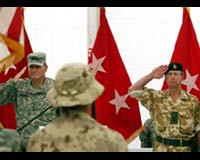| . |  |
. |
Washington (AFP) Nov 13, 2009 President Barack Obama is leaning towards a compromise strategy on troops to Afghanistan, officials said, amid a fierce debate over whether more soldiers should be sent to back up Kabul's flawed government. Defense Secretary Robert Gates said Thursday that Obama was seeking to show a strong US commitment to Afghanistan while also conveying to President Hamid Karzai's corruption-tainted government that the US military presence had a time limit. "How do you signal resolve and at the same time signal you are not going to be there forever?" asked Gates, adding that it was a challenge to "get that balance right." Obama is said to have been presented with a series of options on Afghanistan, three of which envisage reinforcements ranging from 20,000 to 40,000 troops and a fourth that has an undisclosed military element. He was examining how to "combine some of the best features of several of the options to maximum good effect," Gates said. Obama, who departed Thursday on an eight-day trip to Asia, spoke to US troops during a stopover in Alaska, pledging "I will not risk your life unless it is necessary to our vital interests." "We'll give you the strategy and the clear mission you deserve, we'll give you the equipment and support that you need to get the job done, and that includes public support back home," he said. White House spokesman Robert Gibbs said no announcement would be made until Obama returns from Asia on November 19, adding that he expected more meetings with the military top brass before the president reached a decision. "What the president wants to ensure is that we take into account... our time commitment and ensure that we have the strongest partner in the Afghan government," Gibbs told journalists aboard Air Force One. "It's important to fully examine not just how we're going to get folks in but how we're going to get folks out," he added. Leaked cables from the US ambassador in Kabul underlined Thursday the perceived failings of Karzai and his government that have emerged as a key problem holding up Obama's troop decision. Karzai, long supported internationally despite the fact his administration is widely viewed as corrupt, has seen ties with the West sour dramatically since being re-elected in a flawed poll in August. Ambassador to Kabul Karl Eikenberry, a retired army general who commanded US forces in Afghanistan from 2005 to 2007, detailed serious concerns in classified cables leaked to The Washington Post and The New York Times. He reportedly expressed reservations about Karzai's erratic behavior and warned against sending more American troops to Afghanistan until the Afghan leader gets a grip on the corruption and incompetence in his administration. The ambassador's position puts him at odds with Afghan war commander General Stanley McChrystal, who wants more than 40,000 additional US troops over the next year and has warned that without them the mission is likely to fail. Gibbs played down the differences between Eikenberry and McChrystal, suggesting everyone believed it was important for Karzai to turn around the tarnished image of his government. "You've heard General McChrystal say, and you've heard Ambassador Eikenberry say, and you've quite frankly heard the president say that it's time to start a new chapter in Afghanistan when it comes to governance. And that's obviously going to play a big part in the decision that he makes." Huge fraud that marred the August 20 presidential election highlighted the scale of corruption in Afghanistan's government and has led to enormous international pressure on Karzai's new administration to clean up. Karzai was only declared the winner by election officials, whom he appointed, after his challenger, former foreign minister Abdullah Abdullah, abandoned a run-off saying there was no chance of a fair poll. In a recent US television interview, Karzai dismissed allegations against top officials, including his brother Wali, who is widely accused of involvement in the opium trade. The president has also faced widespread criticism for his alliances with warlords and one of his two picks for vice president, Mohammad Qasim Fahim, is widely accused of rights abuses. The Afghan presidency hit back Thursday at the mounting Western concern over corruption, urging the international community to do its part by battling graft in aid contracts.
Share This Article With Planet Earth
Related Links News From Across The Stans
 US Afghan envoy warns against troop surge: reports
US Afghan envoy warns against troop surge: reportsWashington (AFP) Nov 12, 2009 The US envoy to Afghanistan has warned against sending thousands more troops to the country as President Barack Obama weighs strategy options in the eight-year conflict, reports said Thursday. The Washington Post and The New York Times reported that Ambassador Karl Eikenberry, a retired army general who commanded US forces in Afghanistan from 2005-2007, detailed his concerns in classified ca ... read more |
|
| The content herein, unless otherwise known to be public domain, are Copyright 1995-2009 - SpaceDaily. AFP and UPI Wire Stories are copyright Agence France-Presse and United Press International. ESA Portal Reports are copyright European Space Agency. All NASA sourced material is public domain. Additional copyrights may apply in whole or part to other bona fide parties. Advertising does not imply endorsement,agreement or approval of any opinions, statements or information provided by SpaceDaily on any Web page published or hosted by SpaceDaily. Privacy Statement |